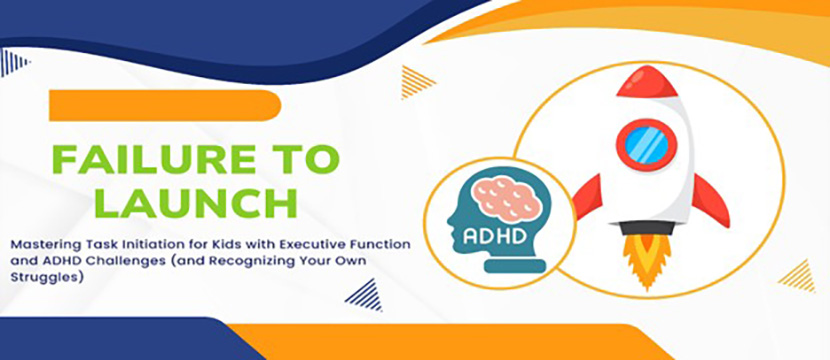
Welcome to our series of 4 blogs that will cover the top areas of executive function that most kids and/or parents experience. This, along with the next 3 in the series, will provide you with some valuable ideas and tips to try with your children. The first area of EF we will tackle is task initiation.
 As parents, we all want to see our kids thrive. But for children with executive function or ADHD challenges, even simple tasks can feel like climbing Mount Everest. One common struggle is task initiation – the ability to actually start something. It’s not about laziness or defiance; it’s a genuine difficulty moving from thinking about a task to actually doing it. This can lead to frustration for both parent and child, but understanding the underlying challenges and implementing the right strategies can make a world of difference. And, importantly, many parents of children with executive function difficulties recognize similar struggles within themselves. It’s not uncommon for these parents to discover they’ve been navigating similar challenges, often undiagnosed, throughout their own lives. This shared experience can bring a unique level of empathy and understanding to the parenting journey.
As parents, we all want to see our kids thrive. But for children with executive function or ADHD challenges, even simple tasks can feel like climbing Mount Everest. One common struggle is task initiation – the ability to actually start something. It’s not about laziness or defiance; it’s a genuine difficulty moving from thinking about a task to actually doing it. This can lead to frustration for both parent and child, but understanding the underlying challenges and implementing the right strategies can make a world of difference. And, importantly, many parents of children with executive function difficulties recognize similar struggles within themselves. It’s not uncommon for these parents to discover they’ve been navigating similar challenges, often undiagnosed, throughout their own lives. This shared experience can bring a unique level of empathy and understanding to the parenting journey.
Imagine your child staring at a pile of homework, a messy room, or even a plate of food, seemingly paralyzed. This isn’t necessarily a choice; their brains may be struggling to shift gears and begin. Task initiation is a key component of executive function, the set of mental skills that help us plan, organize, and execute tasks. When these skills are underdeveloped, as they often are in children with ADHD or executive function difficulties (and potentially in their parents as well), starting anything can feel overwhelming.
What Makes Task Initiation So Tricky for These Kids (and Maybe You)?
Several factors can contribute to this struggle. Kids might feel overwhelmed by the sheer size of the task, not knowing where to begin. They might struggle with prioritizing, making it hard to choose which task to tackle first. Distractibility can also play a major role, with external stimuli easily pulling their attention away before they even get started. Anxiety about performance or fear of failure can also freeze them in place. It’s crucial to remember that these challenges are often neurological, not behavioral. And if you recognize these struggles in your child, consider whether you experience them too. Many parents find that understanding their own executive function profile helps them better support their children.
Empowering Your Child to Start: Strategies That Work (and Strategies for You!)
 The good news is that task initiation is a skill that can be developed with patience and the right approach. A crucial first step is to break down large tasks, way down. Big projects are daunting. Break everything into tiny, manageable steps. Instead of “clean your room,” try “put all your dirty clothes in the hamper,” then “make your bed,” then “put your books on the shelf.” Celebrate each small victory! This strategy works for adults too – breaking down that overwhelming project into smaller, more manageable chunks. Visual supports are also key. Use visual schedules, checklists, and timers. These tools provide structure and help kids see the steps involved. A visual timer can also help with the perception of time, which can be a challenge for many children (and adults!). Make it concrete. Vague instructions are confusing. Be specific and clear about what you want your child to do. Instead of “clean up,” say “put the red blocks in the blue bin and the stuffed animals on your bed.” This clarity is helpful for everyone. Minimize distractions. Create a quiet, dedicated workspace free from distractions like phones, tablets, and TV. This helps your child focus and maintain concentration. This goes for parents too – setting aside dedicated time for focused work can be transformative. Find the “just right” challenge. Start with tasks that are challenging but achievable. Success builds confidence and motivates them to tackle bigger things.
The good news is that task initiation is a skill that can be developed with patience and the right approach. A crucial first step is to break down large tasks, way down. Big projects are daunting. Break everything into tiny, manageable steps. Instead of “clean your room,” try “put all your dirty clothes in the hamper,” then “make your bed,” then “put your books on the shelf.” Celebrate each small victory! This strategy works for adults too – breaking down that overwhelming project into smaller, more manageable chunks. Visual supports are also key. Use visual schedules, checklists, and timers. These tools provide structure and help kids see the steps involved. A visual timer can also help with the perception of time, which can be a challenge for many children (and adults!). Make it concrete. Vague instructions are confusing. Be specific and clear about what you want your child to do. Instead of “clean up,” say “put the red blocks in the blue bin and the stuffed animals on your bed.” This clarity is helpful for everyone. Minimize distractions. Create a quiet, dedicated workspace free from distractions like phones, tablets, and TV. This helps your child focus and maintain concentration. This goes for parents too – setting aside dedicated time for focused work can be transformative. Find the “just right” challenge. Start with tasks that are challenging but achievable. Success builds confidence and motivates them to tackle bigger things.
 Positive reinforcement is essential. Focus on effort and progress, not just the end result. Praise their attempts and celebrate their accomplishments, no matter how small. Avoid criticism, which can increase anxiety and make initiation even harder. This applies to self-talk as well – be kind to yourself! Collaborate and problem-solve. Involve your child in the process. Ask them what makes it hard to start a task and brainstorm solutions together. This fosters a sense of ownership and empowers them to develop their own strategies. And if you’re struggling, consider seeking support for yourself as well.
Positive reinforcement is essential. Focus on effort and progress, not just the end result. Praise their attempts and celebrate their accomplishments, no matter how small. Avoid criticism, which can increase anxiety and make initiation even harder. This applies to self-talk as well – be kind to yourself! Collaborate and problem-solve. Involve your child in the process. Ask them what makes it hard to start a task and brainstorm solutions together. This fosters a sense of ownership and empowers them to develop their own strategies. And if you’re struggling, consider seeking support for yourself as well.
Above all, patience and understanding are paramount. Remember that these challenges are real. Be patient, supportive, and understanding. Celebrate their progress and offer encouragement along the way. And remember to extend that same compassion to yourself.
Helping your child master task initiation is a gift that will benefit them throughout their lives. And if you recognize your own struggles, seeking support and strategies for yourself can be equally transformative. By understanding these challenges and implementing these strategies, you can empower your child – and yourself – to overcome obstacles, build confidence, and reach your full potential.
Ready to help your child thrive? Contact Dynamis Learning HERE to set up a free phone consultation and to discuss your child’s unique needs. Our expert tutors specialize in helping children with ADHD develop effective strategies for homework completion and timely submission, ensuring they receive the academic credit they deserve.
